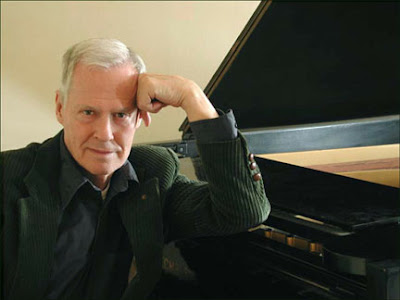Rorem's Our Town a Great Success
 Composer Ned Rorem (b. 1923), photo by Christian Steiner |
The hardwood floors of the set (Tom Donahue) and elaborate circa 1900 costumes (Eleanor Dicks) easily transported the audience to Grover’s Corners, N.H. (pop. 2,642). After a remarkable harmonization of the hymn O God Our Help in Ages Past, sung by the chorus with verses separated by gentle material from the CUA Orchestra, the Stage Manager of this play-within-a-play, tenor Eric Gramatges sings: “Let me show you around our town.” Our Town explores the lives of George and Emily through their youthful courtship, wedding, and Emily’s early death during childbirth. This progression is united with the daily happenings of life in a small American town, engagingly entrenched in “stoic, New England irony.” Rorem, using a full palettte of compositional techniques --including atonality -- phrased in close parallel to J. D. McClatchy’s balanced libretto, while deftly allowing the work to progress in intensity and motion through its three acts.
Cecelia Porter, Rorem's 'Our Town,' Wistfully Wilder (Washington Post, March 1) |
In the Act 3 graveyard scene, Stage Director James Hampton brilliantly had the actual persons sitting in chairs spaced apart where graves would have been. The dead characters then sang of the possibility of going back into their old lives, and of the stress human visitors bring to their graveyard. Emily’s “goodbyes” to the world, reminiscent of the haunting “goodnights” in Britten’s Rape of Lucretia, were piercingly emotional. The emotional intensity was even more powerful when George (John Murray) wept at her feet, thinking it was only her grave.
Ned Rorem's Our Town will be repeated this evening (March 1, 7:30 pm), at Catholic University's Hartke Theater.





















































2 comments:
I heard Diana Bryan sing Emily and she was absolutely stunning! I don't think that her R's and A's were too hard or americanized...it IS an american opera, the only time this would be a problem is if she did it while singing a foreign language. It was certainly an emotional piece and overall everyone did a great job I think.
I have to agree with the previous posting. In an opera, based on a classic American play, by an American composer, set in America, what other type of and "a" or "r" would be appropriate? It's comments like those that make people think opera is a remote art form, as if standard American English pronunciation were unacceptable for singing. Diana sang fabulously.
Post a Comment